
Building Peace between India and Pakistan: Opportunities and Challenges
(Vol 4, No 2, 2012)
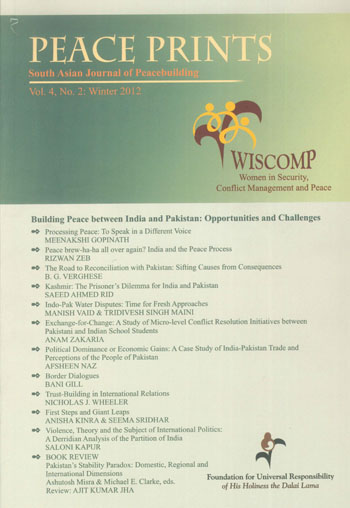
| » |
Editorial
Manjri Sewak & Seema Kakran Read More... |
| » |
Processing Peace: To Speak in a Different Voice
Meenakshi Gopinath Read More... |
| » |
Peace brew-ha-ha all over again? India and the peace process
Rizwan Zeb Read More... |
| » |
The Road to Reconciliation with Pakistan:
Sifting Causes from Consequences
B. G. Verghese Read More... |
| » |
Kashmir: the Prisoner's Dilemma for India and Pakistan
Saeed Ahmed Rid Read More... |
| » |
Indo-Pak Water Disputes: Time for Fresh Approaches
Manish Vaid & Tridivesh Singh Maini Read More... |
| » |
Exchange for Change:A Study of Micro-level Conflict Resolution Initiatives between Pakistani and Indian School Students
Anam Zakaria Read More... |
| » |
Political Dominance or Economic Gains:
A Case Study of India-Pakistan Trade and Perceptions of the People of Pakistan
Afsheen Naz Read More... |
| » |
Border Dialogues
Bani Gill Read More... |
| » |
Trust-Building in International Relations
Nicholas J. Wheeler Read More... |
| » |
First Steps & Giant Leaps
Anisha Kinra and Seema Sridhar Read More... |
| » |
Violence, Theory and the Subject of International Politics: A Derridian Analysis of the Partition of India
Saloni Kapur Read More... |
| » |
Book Review Pakistan's Stability Paradox: Domestic, Regional And International Dimensions Reviewed by: Ajit Kumar Jha Read More... |
Manjrika Sewak is Senior Consultant-Conflict Transformation Program at WISCOMP
Contact:
manjri.sewak@gmail.com
Seema Kakran is Assistant Director at WISCOMP
Contact:
seema.kakran@gmail.com
Contact Us
Archives
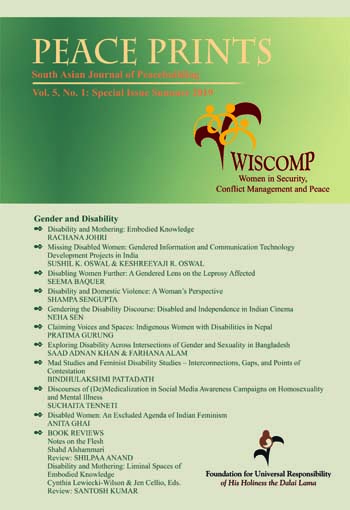 |
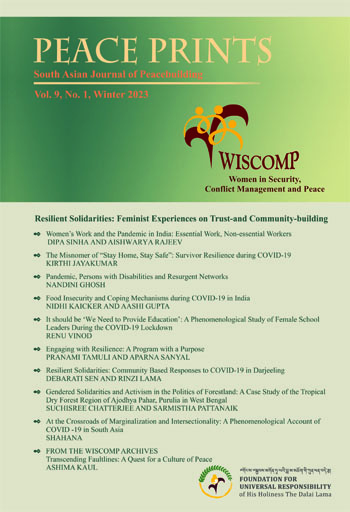 |
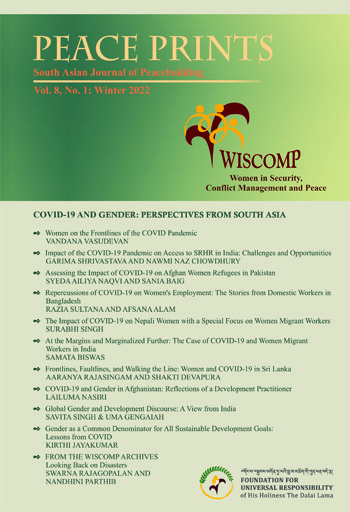
|
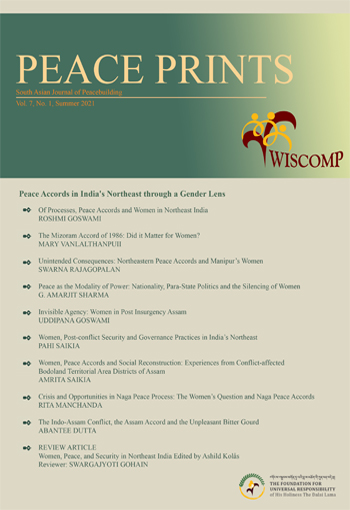
|
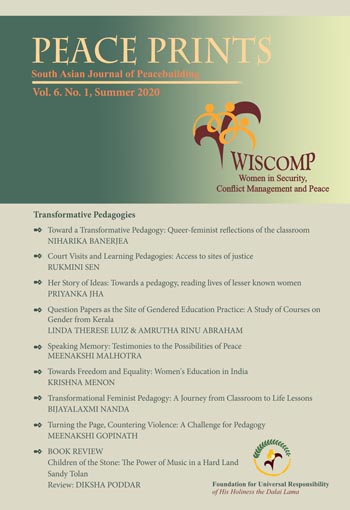 |
|
Being "(Re) Armed": Women and the Security Sector
Volume 10, No. 1, 2024 |
Resilient Solidarities: Feminist Experiences on Trust-and Community-building Volume 9, No. 1, 2023 |
COVID-19 and Gender: Perspectives From South Asia Volume 8, No. 1, 2022 |
Peace Accords in India's Northeast through a Gender Lens Volume 7, No. 1, 2021 |
Transformative Pedagogies Volume 6, No. 1, 2020 |
 |
 |
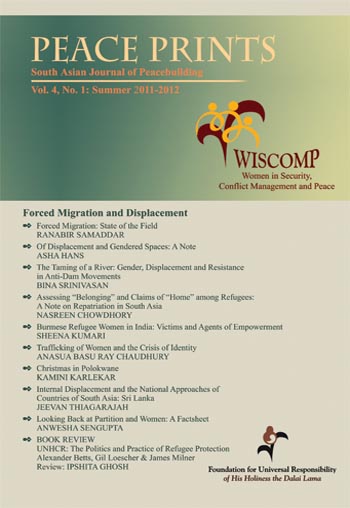 |
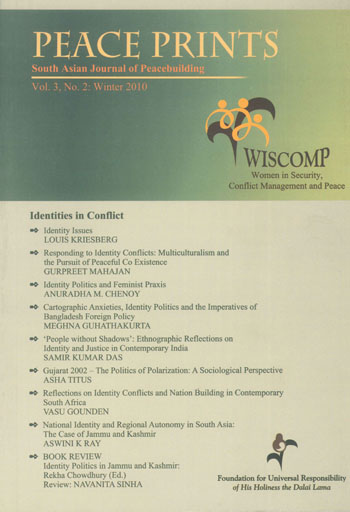 |
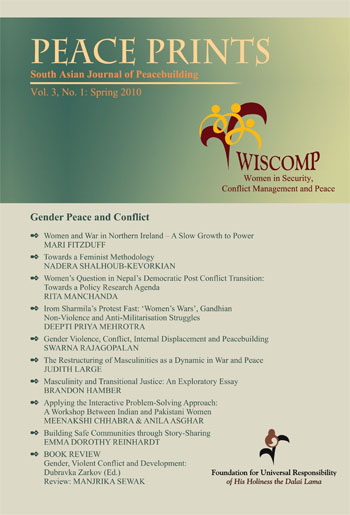 |
|
Gender and Disability
Vol. 5, No. 1, 2019 |
Building Peace between India and Pakistan
Vol 4, No 2, 2012 |
Force Migration and Displacement Vol 4, No 1, 2011-12 |
Identities in Conflict
Vol 3, No 2, 2010 Special Edition |
Gender Peace and Conflict
Vol 3, No 1, 2010 |
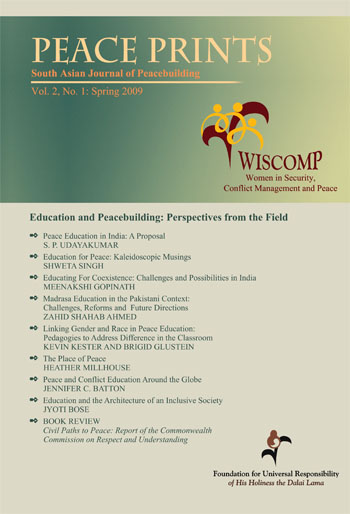 |
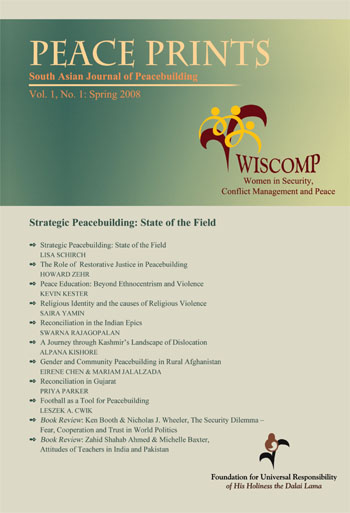 |
|||
| Education and Peacebuilding Vol 2, No 1, 2009 |
Strategic Peacebuilding: State of the Field
Vol 1, No 1, 2008 |
Returning with a Renewed Mission!
Peace Prints is back after a hiatus of six years with a renewed mission to enhance its footprint not just in South Asia but beyond. In keeping with the expansion in the domain of Peacebuilding, Peace Prints has expanded its scope to include the emerging frontiers of scholarship and research. The organizational and funding constraints have been overcome. In this new phase of reorganization, we infuse this pioneering effort with the energy that comes with expanding circles of engagement and linkages to wider networks of both experienced and younger researchers.About WISCOMP
WISCOMP, an initiative of the Foundation for Universal Responsibility has been a pioneer in initiating the discourse on women, peace, and security in South Asia. It was at the forefront of engaging with these issues, well before they found articulation in the UN Security Council Resolution 1325 in October 2000. Its efforts have yielded a robust network across borders and boundaries that highlight the leadership of women in the areas of peace and security—a space that was hitherto not fully encouraging of the participation of women.WISCOMP is an initiative of the Foundation for Universal Responsibility, which was established with funds from the Nobel Peace Prize awarded to His Holiness The Dalai Lama in 1989.
For more information, visit www.wiscomp.org
